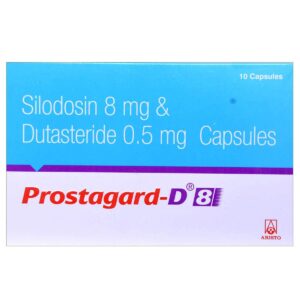DUTASETERIDE + SILODOSIN
Dutaseteride: Dutasteride is a medication that is primarily used in the treatment of benign prostatic hyperplasia (BPH), a noncancerous enlargement of the prostate gland in men. It is also used off-label to treat male pattern hair loss (androgenetic alopecia).
The mechanism of action of dutasteride involves inhibiting the conversion of testosterone to dihydrotestosterone (DHT) by inhibiting the enzyme 5-alpha-reductase. DHT is a hormone that contributes to the growth and enlargement of the prostate gland, as well as hair loss in genetically susceptible individuals. By reducing DHT levels, dutasteride helps to shrink the prostate gland, relieve urinary symptoms associated with BPH, and promote hair regrowth in certain individuals with androgenetic alopecia.
The usual recommended dose of dutasteride for the treatment of BPH is 0.5 mg orally once a day. For the treatment of male pattern hair loss, the dose is also 0.5 mg orally once a day. It is important to take the medication regularly to experience its full benefits.
Like any medication, dutasteride may cause side effects. Common side effects include decreased libido, erectile dysfunction, ejaculatory disorders such as decreased volume of ejaculation, breast enlargement or tenderness, and dizziness. Some individuals may also experience allergic reactions, such as rash, itching, or swelling, although these are rare. It is important to talk to a healthcare professional if any concerning side effects occur. Additionally, dutasteride should not be used or handled by pregnant women, as it can cause harm to the developing fetus.
Silodosin: Silodosin is a medication used to treat the symptoms of benign prostatic hyperplasia (BPH), a non-cancerous enlargement of the prostate gland. It is marketed under the brand name Rapaflo.
The main purpose of Silodosin is to improve urinary flow and relieve symptoms such as difficulty urinating, weak urine stream, frequent urination, and the feeling of incomplete bladder emptying. It belongs to a class of drugs called alpha-1 adrenergic blockers.
Silodosin works by selectively targeting and blocking the alpha-1 receptors in the smooth muscles of the prostate gland, bladder neck, and urethra. This relaxation of the smooth muscles helps to relieve urinary symptoms and improves urine flow.
The usual recommended dose of Silodosin is 8 mg once daily, taken with a meal. It is important to take the medication at the same time every day to maintain consistent levels in the body.
Like any medication, Silodosin can have some side effects. The most common side effects include dizziness, headache, runny or stuffy nose, back pain, diarrhea, and abnormal ejaculation (such as a decrease in semen volume or retrograde ejaculation). These side effects are generally mild and transient.
It is important to note that Silodosin may cause a drop in blood pressure, leading to dizziness or fainting, especially when standing up from a sitting or lying position. To minimize this risk, it is advised to take the medication at bedtime to reduce the potential for orthostatic hypotension.
Silodosin may also interact with other medications, so it is important to inform your healthcare provider about any other drugs you are taking.
In conclusion, Silodosin is a medication used to treat the symptoms of benign prostatic hyperplasia. It works by relaxing the muscles of the prostate gland and surrounding areas, improving urinary flow. It is generally well-tolerated, with common side effects including dizziness, headache, and abnormal ejaculation. As with any medication, it is important to discuss with your healthcare provider to determine if Silodosin is the appropriate treatment for your condition.

